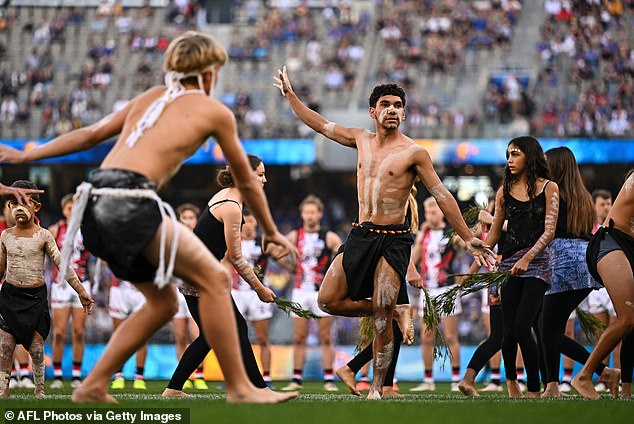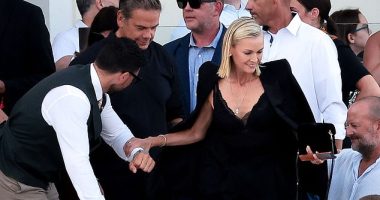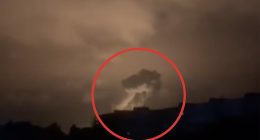A senior businessman has blasted his boss for making every one of their workers perform an Acknowledgement of Country at a meeting.
The worker, who wished to remain anonymous, told the Herald Sun it was ‘comical’ to watch and said he felt compelled to join his colleagues in the ritual.
A childhood educator told the publication that ‘progressive’ workers, the government and peak bodies heaped on pressure to perform the acknowledgements in the private sector.
She said failure to perform the ceremonies would cause her to be ‘crucified’ by other staff members.
‘It’s being pushed down our throats,’ she said.
The criticism comes as the Institute of Public Affairs (IPA) releases the results of a survey undertaken in May which found 56 per cent of Australians believe Welcome to Country ceremonies have become divisive.
That was compared with just 17 per cent who disagreed.
The IPA – a conservative, free market think tank – asked 1,005 Australians whether Welcome to Country ceremonies had ‘become divisive’.

Businesspeople have questioned the role of Acknowledgements of Country in the workplace, as polling revealed voters’ thoughts on Welcome to Country ceremonies (pictured)
Fifty-six per cent of respondents said they agreed they had, while 17 per cent disagreed.
A larger proportion of Australians said the practice should continue before sporting events and ceremonies like ANZAC Dawn Services.
Just under half – 49 per cent – said the Welcome to County ceremonies should no longer take place before sports games, while 30 per cent said they should continue.
At Anzac Day, 34 per cent wanted to see the Welcomes continue, while 46 per cent said they should no longer occur.
A Welcome to Country is a formal ceremony conducted by an Elder or Traditional Owner of the land, granting permission for others to be on their Country.
An Acknowledgment of Country, however, can be delivered by anyone to show respect for the Traditional Owners.
Last week, a Darebin City Council worker scored a major victory after being sacked for objecting to land acknowledgements before work meetings.
The council dismissed Shaun Turner when he questioned the ceremony the first time it was performed at a meeting.

Polling from the Institute of Public Affairs suggested just under half of polled Australians thought Welcome to Countries should not occur at sporting events (stock image)
He told the meeting: ‘If you need to be thanking anyone, it’s the people who have worn the uniform and fought for our country to keep us free.
‘It’s getting out of hand and people are losing it, it is now being done at the opening of a postage stamp.’
Council officers investigated Mr Turner’s alleged ‘serious misconduct’, but he doubled down and won an unfair dismissal case.
The ceremonies took a central place in the lead-up to the May 3 Federal election.
Then-Coalition leader Peter Dutton said he wanted to unite the country under one flag and maintained the ceremonies were ‘overdone’, after Daily Mail Australia revealed both prime ministerial contenders would have to answer a question regarding the ceremonies following an incident at a dawn service.
Prime Minister Anthony Albanese said individual organisations should decide whether to open events with a Welcome, saying the ceremonies were a ‘matter of respect’.
It came after a group of protesters booed the Welcome to Country ceremony during the Anzac Day dawn service in Melbourne on Friday.
Victorians gathered under pre-dawn darkness to commemorate those who paid the ultimate sacrifice, before Bunurong Elder Mark Brown began the Welcome to Country.

Protesters’ boos echoed through loudspeakers during Uncle Mark Brown’s Welcome to Country at the Anzac Day service
But boos and heckles emanating from the front of the crowd began shortly after Mr Brown commenced his speech.
‘It’s our country!’ one heckler yelled.
‘We don’t have to be welcomed!’ another screamed.
Jacob Hersant, a prominent neo-Nazi figure, was allegedly among those loudly booing.
‘This is a day for the Anzacs, it’s not for Aboriginals,’ he told media after the service.
Public opinion was divided following the incident.






